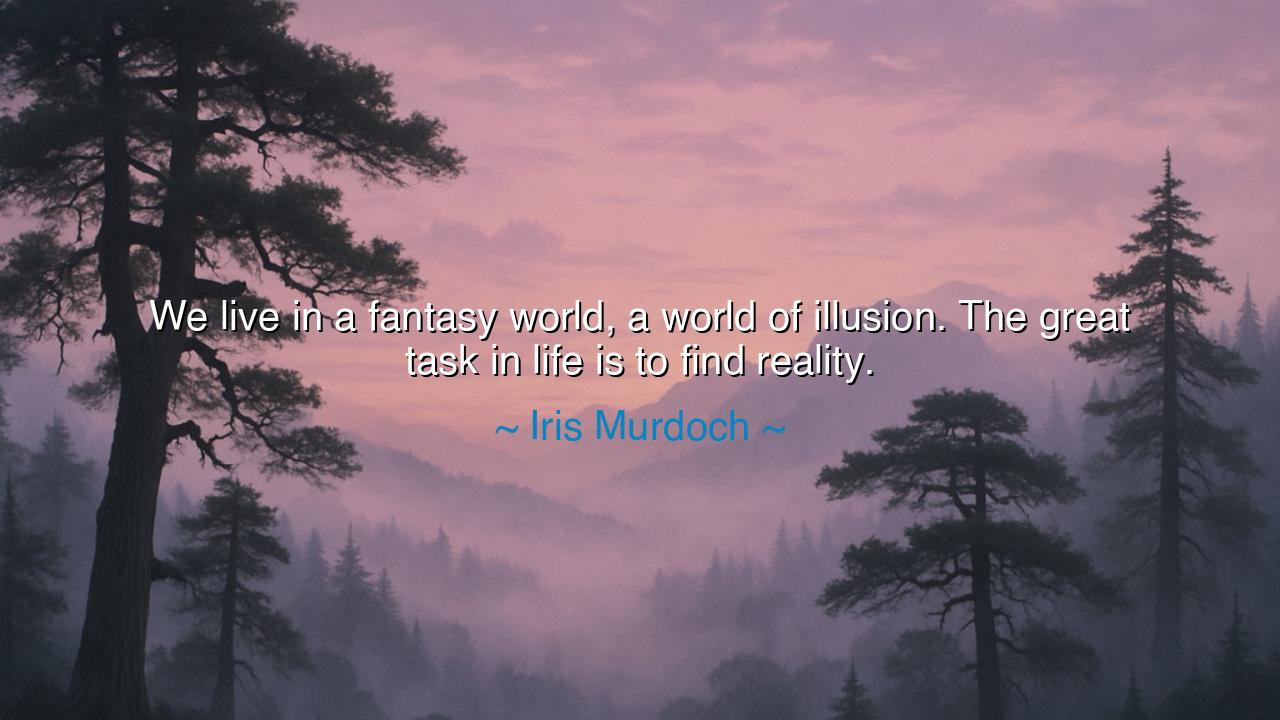
We live in a fantasy world, a world of illusion. The great task
We live in a fantasy world, a world of illusion. The great task in life is to find reality.






The words of Iris Murdoch — “We live in a fantasy world, a world of illusion. The great task in life is to find reality” — strike with the force of a revelation, as though spoken by a sage gazing through the mists that cloud the human mind. Murdoch, a philosopher and novelist of rare depth, understood that the greatest chains of mankind are not forged by others, but by our own imagination, by the dreams, fears, and desires that distort our vision of the world. To live truthfully, she warns, one must pierce through this veil of illusion — to awaken from the comfortable dream and stand before the raw, often difficult face of reality.
In her time, Iris Murdoch stood at the crossroads of art and philosophy. She was a student of Plato, who wrote of the cave in which men mistake shadows for truth. Like him, she saw that humanity builds its own caves — of self-deception, vanity, and desire — and then mistakes their shadows for life itself. Her quote springs from this ancient understanding: that we live not as we are, but as we imagine ourselves to be. The fantasy world she speaks of is not merely fiction or media; it is the daily illusion of self-centeredness, where the ego becomes the center of the universe. To find reality, one must therefore wage the hardest of wars — the battle against one’s own blindness.
This is not the illusion of dreams, but of perception. We see only what we wish to see: our successes, our righteousness, our griefs enlarged beyond proportion. We invent stories about others, about fate, about ourselves, until truth becomes unrecognizable. Murdoch’s insight reveals that the true philosopher — and indeed, the true human being — must seek to see clearly, to love without distortion, to act without self-interest. She wrote that “love is the extremely difficult realization that something other than oneself is real.” In this, we find the essence of her quote: to find reality is to escape the prison of self.
History, too, offers many who have walked this same road from illusion to truth. Consider the story of Siddhartha Gautama, the Buddha. Born into luxury, he lived in a palace of comfort and splendor, shielded from pain and impermanence. His world was one of fantasy — an illusion carefully constructed to protect him from the sight of death and suffering. But when he finally stepped beyond the palace walls and saw sickness, old age, and death, his illusion shattered. It was this encounter with reality that awakened his compassion and led him to enlightenment. His journey mirrors Murdoch’s call: that the great task of life is not to build grand illusions, but to awaken to the world as it is, even when it breaks the heart.
Yet, as Murdoch understood, to seek reality is a lifelong discipline. It demands humility — to accept that one’s own vision is flawed — and courage, to face truths that unsettle and change us. In her novels, characters often stumble through moral fog, mistaking selfish desire for love, pride for purpose, or comfort for goodness. Only when they strip away illusion do they begin to glimpse the truth of being — that love, beauty, and goodness exist beyond the narrow walls of the self. Thus, finding reality is not an intellectual act but a moral awakening, a purification of the heart.
In our modern world, where illusion multiplies through screens and noise, Murdoch’s warning rings truer than ever. We live surrounded by manufactured fantasies — the illusion of perfection, of success, of control — and we lose ourselves in them. We confuse appearance for essence, opinion for truth, pleasure for meaning. To seek reality now requires silence, reflection, and compassion — the willingness to see others as real, not as extensions of our own needs or fears. It is the same ancient task, but harder now, for the illusions have become subtler, more seductive, and more relentless.
Let this then be the lesson drawn from Iris Murdoch’s wisdom: the journey toward reality begins with the stilling of the ego. Look upon the world not as a mirror, but as a mystery. Listen before you judge, observe before you assume, love before you demand to be loved. The truth is not hidden from us — we are hidden from it, behind the walls of our own fantasy. To tear down those walls is painful, but it is the pain of awakening. For when the illusions fall away, what remains is not despair, but freedom — the clear, radiant light of reality itself.
Thus, remember Murdoch’s words as a guide for life: We live in illusion, but our destiny is to find truth. To find it, one must walk the hard path of honesty, humility, and love — for only those who dare to see the world as it is will ever know what it means to truly live.






AAdministratorAdministrator
Welcome, honored guests. Please leave a comment, we will respond soon